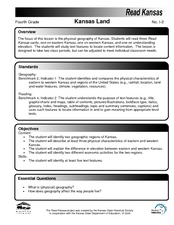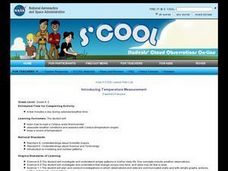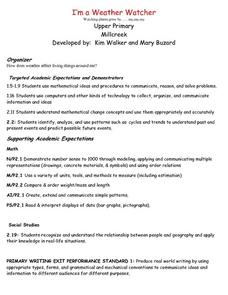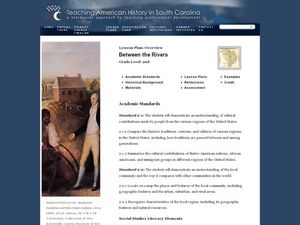Curated OER
Peer Pressure
Young scholars talk about how their peers can influence their behavior. In this peer pressure lesson, students complete a KWL chart on peer pressure, read a handout on peer pressure and break into groups to discuss the information. Young...
Curated OER
Fossils: The Eras of the Earth's History
Students research the four geologic eras of Earth's history. In this extension on a fossils lesson, students research the different eras of Earth's history. Students use AppleWorks to create a bar graph containing information of the four...
Curated OER
Kansas Land
Fourth graders discover the geographic regions of Kansas. In this geography instructional activity, 4th graders explore the different regions of Kansas and determine how the different geography affects daily life in Kansas.
Curated OER
Census Sensibility
Students examine the importance of the census and census data collection methods. They gather statistical data, create graphs comparing state and national populations, and compose written reflections on why the census is necessary.
Curated OER
Nutrition Labels
Students read and interpret nutrition fact labels ("food labels") from food products, a task that involves the use of various mathematics skills (e.g., number concepts and number sense).
Curated OER
Where In the World Are We?
Fifth graders read postcards and find their locations on maps. They use the pictures and text on the postcards to write about imaginary vacations. They compute the mileage and compare it to TripMaker data.
Curated OER
Washing Hands
Students read stories, conduct experiments and create graphs as they consider the importance of proper hygiene in maintaining their health. They identify the best way to wash hands and design handwashing posters for classroom placement.
Curated OER
When Push Comes to Crunch
Eighth graders engage in an experiment which uses an inclined plane and balls of various masses to determine the effect a large object has on a small object. They study velocity, momentum, gravity and forces.
Curated OER
1st Grade - Act. 03: T-Shirt Glyph
First graders create glyphs (symbols or icons) which represents them, and read the glyphs of others using a legend to explain the data on the glyphs.
Curated OER
From Sea to Shining Sea
Students study the geography of the United States of America. Students write letters, create travel brochures, make maps, graph population numbers, read fiction and nonfiction selections, complete KWL charts, and watch films.
Curated OER
Schools
First graders complete a unit of lessons on school and how schools have changed. They read a Laura Ingalls Wilder excerpt, view and discuss a Norman Rockwell painting, conduct an interview, construct a school map, and create an ABC book...
Curated OER
Introduction to Polynomials
Pupils analyze the graphs of polynomial functions, examine vocabulary associated with polynomials, and determine the maximum number of real roots possible for a polynomial
Curated OER
Introducing Temperature Measurement
Pupils explore temperature and use Celcius thermometers to measure and graph the temperature in the classroom daily. They estimate what they think the temperature might be and then find the actual temperature in the room.
Curated OER
Understanding Cloud Formation
Students view a demonstration that simulates cloud formation. They read a poem about clouds, participate in a class demonstration using warm water and ice and write a paragraph summarizing their observations.
Curated OER
Language Arts: Lewin Project
Fourth graders read and respond to the poem, "When I Am Angry." They complete surveys by analyzing the most common feeling and draw a bar graph of their behavior, using different colors to identify the duration of various feelings. ...
Curated OER
Journal of the Stars
Students receive balloons representing the "Life Cycle of the Stars." As the attached script is read, students follow the directions for the color of balloon they are given. Students chart the results for their star. They plot data from...
Curated OER
Teaching Imagery with Gary Paulsen
Students read excerpts from memoirs written by Gary Paulsen as examples of how to write a narrative piece. They identify figurative language used and then they write a memoir of their own that contains imagery and figurative language.
Curated OER
I'm a Weather Watcher Watching plants grow by......my,my,my
Students investigate how weather affects how plants grow. They collect data on weather and plant growth for a week and display the data on a graph. For a culminating experience they design a movie using software that shows plant growth...
Curated OER
Assessing Health Habits
Seventh graders discuss what are the characteristics of a personal with good health. They read an article about influences on health and discuss and perform a self assessment to gauge their personal health. They then go to the gym and...
Curated OER
Seasons
Students explore the four seasons. Through observation activities, they explore and discuss the weather changes that occur during each season. Students create a graph of the clothing that is worn during each season.
Curated OER
How Does It Feel?
Students identify the textures of materials in their environments in order to expand their language, math, sensory, and observational skills. In this sensory activity lesson, students first write a list of different words to describe...
Curated OER
Cleaning Up
Students demonstrate how to be a philanthropist. In this philanthropy lesson plan, students read the story The Wartville Wizard and discuss ways to become a philanthropist. Students participate in a good deed by volunteering to clean up...
Curated OER
Problem Solving: Steps and Strategies
Students explore the concept of problem solving strategies. In this problem solving strategies instructional activity, students discuss methods for solving problems such as re-reading a problem, stating the facts, drawing a picture and...
Curated OER
Between the Rivers
Second graders compare and contrast historical American cultures. In this American history lesson, 2nd graders participate in reading, writing, oral, and hands on activities. Students discuss the similarities and differences...

























